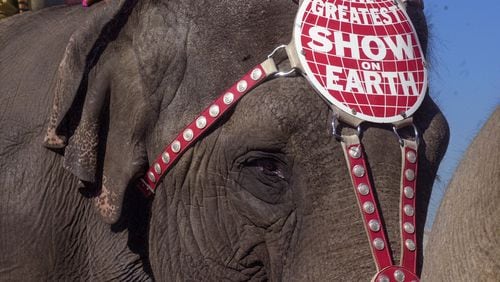On a Sunday morning in November 1938, a caravan of 50 railroad cars snaked down the Southern Railway tracks to Highland Avenue. A crowd began to form, filled with onlookers who had been waiting all year for the moment Ringing Bros. and Barnum & Bailey Circus (RBBB) rumbled back into town.
Atlantans watched as Percheron horses pulled the circus wagons carrying Madame Toto, the female gorilla and her pet kitten; lions and tigers and other animals. Then came the elephants, dozens of elephants, some mingling so close to the crowd, it seemed as if they were watching the action as well.
That year the show was called the Al G. Barnes and Sells Floto Circus featuring acts from Ringling Bros. and Barnum & Bailey. RBBB was having trouble with a labor strike. Instead of sending the full circus to Atlanta, it sent 21 cars of its best acts to pair with its subsidiary. The following year, the circus would bounce back to its full glory with 90 railroad cars, more than 1,500 humans and more animals than anyone had ever seen.
Now, almost 80 years later, Ringing Bros. and Barnum & Bailey circus is shutting down for good. After 146 years, the American institution will play its final show in May. It makes its last appearance in Atlanta from Feb. 15 - Feb. 20 at Philips Arena.
Feld Entertainment, the parent company of Ringling Bros., said low attendance, high costs, and a shift in public tastes have made it difficult to continue operations. The circus saw a major decline in ticket sales after retiring the elephants from the show in May 2016.
For decades, PETA and other animal rights groups had protested the circus and its treatment of animals, particularly the elephants. Still, when the announcement came earlier this month that RBBB was closing for good, longtime circus fans were in disbelief.
"I was not really surprised, but I was nevertheless stunned," said Richard Reynolds, 82 of Brookhaven, an international expert on all things circus related and Trustee Emeritus of the Circus Historical Society.
Ringling Bros. still uses more than 50 train cars to transport the circus, he said, and some of the equipment is likely old and in need of replacement. In addition, some equipment -- such as the 89 feet-long cars once used to move acts from city to city -- is no longer being made. The cost to keep it all running is prohibitive and it doesn't help that the crowds just aren't coming like they used to.
"The public's attention is so diverted to everything imaginable. People aren't as impressed with the arrival of the show as they were when I was a child. Back then, there was nothing else to compete with it," said Reynolds.
In 1907, Ringling Bros. circus purchased Barnum & Bailey circus for $500,000, said Reynolds. PT Barnum died in 1890 and when his partner James Bailey took the show to Europe, Ringling Bros. began dominating in the U.S.. Bailey died in 1906. After the sale, the shows ran separately until 1919 when the combined Ringling Bros. and Barnum & Bailey Circus made its debut in New York.
The combined show first came to Atlanta in 1919 at the Ponce de Leon baseball park. By 1924, it had moved to the Highland Avenue grounds (currently occupied by Inman Park Village) where it remained for 20 years.
Before the Highland Avenue days, when the circus was held on the site where Ebenezer Baptist Church now stands, a parade heralded the return of the circus to town. That practice had been discontinued by the time Reynolds attended his first Ringling Bros. and Barnum & Bailey circus in 1937.
He was three-years-old when his dad took him to the circus on a Monday afternoon. Passing through the menagerie on the way to the big top, Reynolds got a view of anteaters, the "blood sweating" hippopotamus and the clowns. Atlanta had a mediocre zoo at the time, he said, and the menagerie was the best place to see wild animals. Once they entered the big top, Reynolds and his dad climbed up the bleachers to general seating where Reynolds strained to see the elephants parading trunk to tail.
The whole town would turn out for the circus, said Reynolds. Kids were dismissed for the day to catch the afternoon shows. Reynolds, a graduate of Marist School, recalled being teased by classmates who couldn't believe he still attended the circus as a teenager.
Reynolds never tired of seeing his favorite acts such as the Swiss performer who climbed a 10-foot spire and stood on one hand with a walking cane as rings swirled around his ankles. "Deep Purple," played in the background as he dramatically placed his hand on an illuminated glass ball and balanced on his forefinger.
There was also Alfred Court, the French animal trainer who presided over a group of lions, tigers, bears, leopards, Great Danes and more and Charly Baumann, who commanded his tigers to sit atop a rotating pedestal with a mirrored ball underneath.
Reynolds attended every Ringling Bros. and Barnum & Bailey circus from 1937 to 1945, and he recalls only one local tragedy.
In 1941, the circus had arrived for a run with 47 elephants. The animals had been feeding on a chemical dumping ground during their previous stop in Charlotte. When they arrived in Atlanta, 18 of the elephants became sick and 10 died. Veterinarians found arsenic in their systems.
"They buried them not far from where Bacchanalia (the restaurant) is now. They just dug a big grave and put the bodies of the elephants in there," Reynolds said.
After World War II, television and films began competing for the attention of circus goers and RBBB underwent many changes. They did away with big top tents and whenever possible, moved the event indoors.
In Atlanta, the show last played outdoors at Lakewood Park in 1955. Atlanta didn't have an arena large enough to accommodate the circus at the time, so in 1958 to 1960, the circus came to Ponce de Leon baseball park. Then it stopped coming to Atlanta altogether. It would take 13 years for the show to return with a 1973 appearance at the Omni. It was a packed house, Reynolds said. When the show ended, the company ran a "Thank You Atlantans" ad in the newspaper.
The Feld family first purchased the circus in 1967. They got rid of the freak shows. They brought in more clowns and launched a clown college. In 1969 the company went public, but was soon purchased by Mattel. The Feld family continued to manage the property and purchased it back in 1982. By then, the circus was in heavy competition with many other attractions. People increasingly seemed unimpressed with what the circus had to offer.
Along with people's attitudes, the circus also began to change. Circus shows stopped traveling in a huge caravans. Acts were booked separately and animals were often contracted from trainers. Animal activists stepped up their efforts to get animals removed from shows.
When RBBB eliminated elephants from the show last year, officials said people just stopped coming. Reynolds said he isn't sure what will happen to the circuses that still come to town -- the Big Apple Circus and UniverSoul Circus, to name a few -- but he imagines that the same forces that shut down RBBB could have an impact on those operations as well.
Reynolds was at the Ringing Bros. and Barnum & Bailey show last year to see the elephants take their last stroll around the ring and in February, he will be at Philips Arena again for the final Atlanta performance of the Greatest Show on Earth.
About the Author







